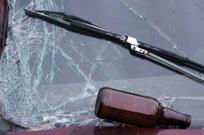Fitness to drive
Fitness to drive
Drivers in Europe must meet minimum standards of physical and mental fitness to obtain a driving licence. However, individual EU countries can introduce stricter requirements.
EU law has been revised to allow people with epilepsy, diabetes and other diseases that can affect driving to continue to drive if their conditions can be controlled.
Professional drivers are subject to stricter controls of their physical and mental fitness. The new laws will require that they undergo a medical check every five years.
Drinking, drugs and driving
Driving under the influence of alcohol is a factor in approximately 25% of fatal crashes, claiming about 6 500 lives in Europe in 2012. Other substances – medicine as well as illegal drugs – are a road safety problem, either in isolation or in combination with alcohol.
All EU countries have limits on the amount of alcohol drivers can consume. For other drugs, legal thresholds are not always defined. Determining the danger becomes more complicated when different drugs are used in combination.
In 2013, the Commission published a study on preventing drink driving by using alcohol interlock devices. This looked at their effectiveness in reducing alcohol-related road accidents and the costs and benefits of the various options for implementing them.
In 2006, the EU launched the four-year DRUID project to study how the use of mind-altering ("psychoactive") drugs affects skill behind the wheel. One of the largest such efforts in Europe to date, the €18m project involves researchers in more than 20 countries.
Fatigue
Fatigue is a factor in 10-20% of road accidents. Professional lorry drivers in particular are at risk of being involved in a fatigue-related crash. EU law limits the time these drivers are allowed to work.
One way to reduce such accidents could be to equip vehicles with monitoring systems to alert drivers who show signs of dropping off.
Useful links
- IMMORTAL [50 KB]
- DRUID
- ROSITA 2 [45 KB]
- AWAKE
- Passenger transport by coach [487 KB]
- GLARE [48 KB]
- QUAVADIS [48 KB]
Legislation
- EU recommendation 2001/115/CE – maximum permitted blood alcohol content for drivers
- EU resolution (November 2003) – impact of psychoactive substances use on road accidents
- Council Conclusions of 29 June 2000 on Medicinal Products and Public Health, 2000/C 218/04
Reports
- Cardiovascular diseases and Driving in Europe
- EMCDDA webpage on driving
- Study on alcohol interlocks
- Report on visual functions of drivers
- Epilepsy and Driving in Europe
- Diabetes and Driving in Europe
- Report on Obstructive Sleep Apnoea Syndrome

